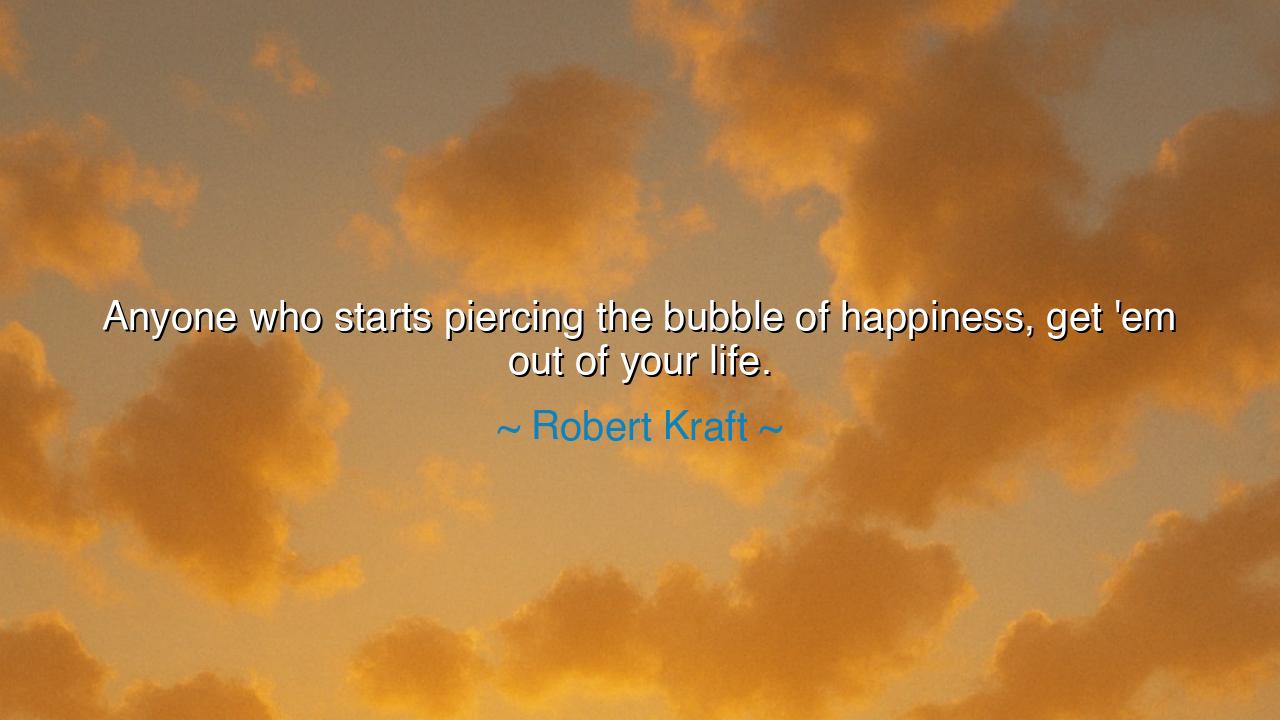
Anyone who starts piercing the bubble of happiness, get 'em out






The modern sage of enterprise, Robert Kraft, once declared: “Anyone who starts piercing the bubble of happiness, get ‘em out of your life.” At first hearing, these words may sound simple, even blunt—but beneath them lies a deep and ancient truth. For what is this bubble of happiness but the fragile sanctuary of the human soul—the peace we build within ourselves, often after great struggle, to protect our light from the storms of the world? Kraft speaks as one who knows that joy, like fire, must be guarded; that those who approach with needles of envy, bitterness, or scorn must be kept far, lest they extinguish the warmth we fought so hard to kindle.
To pierce the bubble of happiness is not merely to disagree or challenge; it is to drain the spirit, to sow doubt where there was peace, to wound what is tender and still healing. Every person who walks the path of life must learn this: happiness is not found, it is crafted, through years of labor, reflection, and forgiveness. It is the garden of the soul, watered by gratitude and patience. And just as a gardener builds fences to keep out the beasts that trample blossoms, so must we build boundaries to protect the joy that sustains us.
From the earliest times, the wise have known that company shapes destiny. In the scriptures of the East, it is said that one bad companion can undo the virtue of a hundred good deeds. In the West, the philosopher Seneca warned, “Associate with those who will make a better man of you.” Robert Kraft’s teaching is an echo of these timeless voices: guard your spirit as a king guards his citadel. For joy is the most precious of treasures, and the thief of joy is seldom an enemy from afar—it is often one we have invited into our own home.
Consider, then, a tale from history—the life of Marie Curie, the great scientist who endured isolation, envy, and misunderstanding as she pursued her discoveries. Many sought to diminish her, to tear at the radiance of her spirit because her success challenged their pride. Yet she refused to let their malice pierce her inner peace. She chose her companions wisely, surrounding herself with those who nurtured her purpose and shared her flame. In doing so, she preserved not only her happiness, but her destiny. Like a warrior guarding sacred light, she let no bitterness dim her path—and thus her name endures, bright as the elements she revealed.
So too must we learn this art of discernment. Not all who smile wish us well; not all who walk beside us belong on the road ahead. The wise person knows when to close a door gently but firmly, saying: “You may not enter my peace.” This is not cruelty—it is self-respect. For the soul that tries to please everyone will soon please no one, and the heart that tries to heal all wounds will bleed itself dry. To remove those who wound your joy is to honor the sacred within yourself; to let them stay is to offer your light to the darkness.
Kraft’s words are a call to courageous clarity. To live joyfully is not to live naively; it is to stand guard over one’s happiness as a shepherd over his flock. You must know when a presence nourishes and when it poisons. The ancients said, “Keep the company of the radiant.” Seek those who make you laugh with sincerity, who rejoice in your blessings, who lift you upward rather than weigh you down. Life is too brief, and joy too rare, to spend it in the shadow of those who cannot bear your light.
Thus, let this be the teaching passed down: protect your bubble of happiness, for it is your temple. Do not apologize for peace. Do not justify joy. If someone comes to steal it, let them go their way and bless them from afar. Surround yourself with those whose hearts are open, whose laughter heals, whose words kindle courage. And when your own spirit is strong, you too will become the kind of soul who never pierces another’s bubble—but instead helps it rise, gleaming, toward the sun.
For as Robert Kraft reminds us, the art of a happy life is not to please all people, but to preserve your joy so it may serve the world. Happiness is not selfish; it is the wellspring of kindness, creativity, and love. Guard it fiercely, nurture it daily, and share it freely—but only with those who know how to hold it with care.






AAdministratorAdministrator
Welcome, honored guests. Please leave a comment, we will respond soon